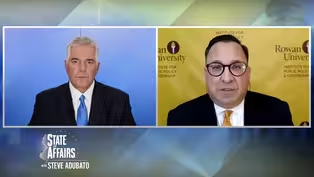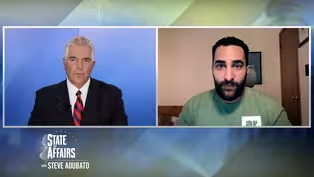State of Affairs with Steve Adubato
President of NJ Transit talks about service & reliability
Clip: Season 9 Episode 13 | 9m 39sVideo has Closed Captions
President of NJ Transit talks about improving service & reliability of public transit
Kris Kolluri, President & CEO of NJ Transit, joins Steve Adubato to discuss the unique leadership challenges in his role and the efforts to improve the service, reliability, and fiscal health of public transportation in New Jersey.
Problems playing video? | Closed Captioning Feedback
Problems playing video? | Closed Captioning Feedback
State of Affairs with Steve Adubato is a local public television program presented by NJ PBS
State of Affairs with Steve Adubato
President of NJ Transit talks about service & reliability
Clip: Season 9 Episode 13 | 9m 39sVideo has Closed Captions
Kris Kolluri, President & CEO of NJ Transit, joins Steve Adubato to discuss the unique leadership challenges in his role and the efforts to improve the service, reliability, and fiscal health of public transportation in New Jersey.
Problems playing video? | Closed Captioning Feedback
How to Watch State of Affairs with Steve Adubato
State of Affairs with Steve Adubato is available to stream on pbs.org and the free PBS App, available on iPhone, Apple TV, Android TV, Android smartphones, Amazon Fire TV, Amazon Fire Tablet, Roku, Samsung Smart TV, and Vizio.
Providing Support for PBS.org
Learn Moreabout PBS online sponsorship[INSPRATIONAL MUSIC STING] - We're now joined by Kris Kolluri, President and CEO of (Steve snapping) New Jersey Transit.
Good to see you, Kris.
- Good to see you, Steve.
- Kris, I gotta ask you, the website is up right now.
We've known each other for a couple decades.
You always seem to take on challenging jobs.
A, in all seriousness, why take on this job?
B, why is it so incredibly challenging to lead New Jersey Transit?
- Look, Steve, first of all, thanks for having me.
- Of course.
- Look, I love stress is the short answer.
But look, there's a more serious answer to this.
When the governor and I talked about taking this job back in December, he wanted to make sure that he finishes the job that he started.
It is an extraordinarily complex organization, as you know, with incredibly challenging problems that are some of our making, some that are not of our making.
So he wanted to make sure that I work with him to implement some of the things that he's been talking about, and I'm sure we'll talk about those as we go along.
And I consider it an incredible privilege to have this opportunity.
I wouldn't have it any other way.
- So the strike, as we're doing this program toward the end of June, the strike's over, right?
- It is.
- I'm a student of leadership, Kris Kolluri, as you know.
The biggest lesson you learned as a leader in negotiating around that strike.
- Two things, one is you never give up on your principles, two, you have to find common ground with the people sitting across the table.
It takes two to make a deal.
And the governor and I, I will tell you, never wavered on our fundamental principle, which is we have to have a fiscally fair deal.
But when we went into that room to negotiate, we knew we had to find common ground, and we did.
- Okay, so you mentioned governor a couple times now, so I'm curious about this.
Governor Murphy will be leaving in January of 2026.
What about you?
- I will be leaving with him a few days later.
My contract goes until January 31st, 2026.
It is my expectation I'll leave.
- So you're on this tight timeframe, right?
How does that impact how you do what you do with that sense of urgency?
- It's actually good, Steve, and I'll say this to you.
I am, and you are a student, not just of leadership, but you're also a student of how to move things from point A to point B.
Your dad was like that too.
For me- - He was a lot better than I am, but go ahead.
- Well, he's a lot better than all of us.
He was an extraordinary man.
- Thank you.
- And for me, these 12 months that I'm given this opportunity has really sharpened my focus on moving the dial on a couple of very important things.
One is customer service, reliability, but two, Steve, is fiscal foundation.
I think we often forget how important it is when you're running an agency this big to make sure you leave the next person with a fiscally sound organization so they can build on it.
And the third thing is, for me, this organization has been around for 45 years, and we still have rail cars that are from the 1970s.
I don't know how you run a 21st century rail system with cars built in 1970s.
So before the governor leaves office, we will have ordered every single rail car and every single bus necessary to modernize the system by 2031.
Never been done before.
I will get it done before I leave, and that's what the governor said he's mandating.
- You're talking a lot about economics and fiscal responsibility.
Along those lines, a 15% fare hike took place in July of 2024, first in about a decade.
Also, what happens is a 3% scheduled increase, literally in weeks from when we're doing this program in July of 2025.
This will be seen later.
Justify for folks, Kris, "Hey, why am I paying more if the service has not improved significantly or in any way that I can recognize?"
Help folks understand that.
- It's a very important question.
I think it's important to know that nationwide, you are very lucky on a mass transit system if you make 46 cents on a dollar.
That means for every dollar the taxpayers invest in us, we start off by not making 54 cents back.
That is the economics of mass transit.
It is never meant to be a profit-making enterprise.
It is always meant to be focused on moving people.
In order to do that, you have to have consistent input of revenue coming in, and the fares are the biggest chunk of that.
The challenge for this, Steve, and look, I've been around this rodeo now for a quarter century.
I will take some of the blame for it because and the governors past that I've worked for were equally to blame for not raising the fares on a consistent basis on small increments.
So what happens?
You try to play catch up, and you increase it by a huge number.
So what I think the governor has put in place now is a very rational incremental increase in fares so we never come back to a position we were a year ago.
This is how, and see, this is sort of a personal thing of mine.
Now, maybe my it's my age that's catching up.
We keep talking about affordability in this state and this country.
- Yeah.
- But nobody wants to take responsibility for paying for the bills today because you've seen this, and I've seen this, it is always politically expedient to kick the can down the road, and let somebody else pay for it.
- What would real, Kris, sorry for interrupting, what would real leadership look like?
"Listen, I don't want to get blamed for this.
I wanna win the next election.
I don't want people to say that I oversaw a fare increase."
But you're saying, "Hey, we're paying the price for that on another level."
- We are paying the price for it.
- You're saying just do it and take the hit and explain it?
- We are paying the price for it on another level because eventually, eventually, we all end up paying for it one way or the other.
And you know what?
It always is more expensive.
So my suggestion to anybody who's in my chair or in any other chairs of responsibility, you have to level with the people and say what it's gonna cost.
I am telling you, we are not gonna be in a state that is, anymore than it already in many instances is unaffordable according to any poll you look at.
But we cannot as a state keep saying, "We will do something that is convenient today, and let somebody else pay for it."
That's why, Steve, this negotiation I went through with the BLET was so important.
- Were they the engineers?
- Excuse me.
- Sorry.
That's correct.
- Good ahead.
Sorry.
- They're the locomotive engineers.
It would've been so easy for the governor and me to say, "We're here only for six more months, and the pay is not gonna really come into play till 2027.
What do we care?"
And I think the conclusion we came to was exactly the right one.
We just say we have to be the ones that say, "We're not gonna put the next governor in a position to pay for it for a decision we made today."
- Kris Kolluri, President and CEO of New Jersey Transit, while the governor has a tough job, this is also an incredibly difficult job.
And Kris Kolluri will be in that job till the end of the calendar year and then move on to his next very stressful leadership challenge.
Kris, good to see you, and thank you for joining us.
We appreciate it.
- Thank you so much.
- You got it.
I'm Steve Adubato.
That's the head of New Jersey Transit.
We should give out his personal mobile.
No, I'm only joking.
(laughing) We'll be right back right after this.
- [Narrator] State of Affairs with Steve Adubato is a production of the Caucus Educational Corporation.
Funding has been provided by The Russell Berrie Foundation.
RWJBarnabas Health.
Let’s be healthy together.
Valley Bank.
Delta Dental of New Jersey.
PSEG Foundation.
New Jersey Manufacturing Extension Program.
The New Jersey Economic Development Authority.
Congress Hall.
A Cape Resorts property.
And by IBEW Local 102.
Promotional support provided by Meadowlands Chamber.
And by New Jersey Monthly.
- (Narrator) Public service.
It's what we do, at the PSEG Foundation Through volunteer hours, partnerships and our other contributions.
We're committed to empowering communities.
We work hand in hand with you, our neighbors, to educate young people, support research, environmental sustainability and equitable opportunities, provide training and other services all over New Jersey and Long Island.
Uplifting communities.
That's what drives us.
The PSEG Foundation.
Addressing the key issues shaping the race for NJ governor
Video has Closed Captions
Clip: S9 Ep13 | 10m | Addressing the key issues shaping the race for NJ governor (10m)
How this non-profit assists the homeless population in NJ
Video has Closed Captions
Clip: S9 Ep13 | 8m 47s | How this non-profit assists the homeless population in NJ (8m 47s)
Providing Support for PBS.org
Learn Moreabout PBS online sponsorship
- News and Public Affairs

Top journalists deliver compelling original analysis of the hour's headlines.

- News and Public Affairs

FRONTLINE is investigative journalism that questions, explains and changes our world.












Support for PBS provided by:
State of Affairs with Steve Adubato is a local public television program presented by NJ PBS

